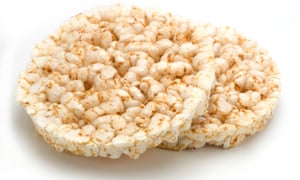Dangerous levels of arsenic found in rice cakes for babies
Study by Queen’s University Belfast finds 50% of baby rice products contain illegal level of inorganic arsenic
 The British Specialist Nutrition Association said that if the products were tested now, the arsenic content would fall within the recommended levels. Photograph: Alamy
The British Specialist Nutrition Association said that if the products were tested now, the arsenic content would fall within the recommended levels. Photograph: AlamyDenis Campbell Health policy editor
Thursday 4 May 2017 19.02 BSTLast modified on Friday 5 May 2017 00.45 BST
Almost three-quarters of rice cakes and other rice-based foods aimed at babies and young children contain dangerously high levels of arsenic, which has been linked to health problems including cancer.
The findings raise doubts about the effectiveness of EU rules brought in only last year to reduce the amount of the toxic chemical, which can impair a baby’s physical and mental development.
Dangerous levels of inorganic arsenic are also often found in babies who have been reared on formula milks, especially non-dairy versions, according to the research by experts at Queen’s University Belfast.
“This research has shown direct evidence that babies are exposed to illegal levels of arsenic despite the EU regulation to specifically address the health challenge,” said Andy Meharg, a professor of plant and soil sciences at Queen’s, who led the research. “Babies are particularly vulnerable to the damaging effects of arsenic, which can prevent healthy development of a baby’s growth, IQ and immune system, to name but a few.
“Products such as rice cakes and rice cereals are common in babies’ diets. This study found that almost three-quarters of baby crackers specifically marketed for children exceeded the maximum amount of arsenic.”
The European commission introduced new rules in January 2016 setting out the legal maximum amount of inorganic arsenic that food manufacturers can put in rice and other rice products consumed by many children. However, Meharg and his co-authors have found out that the composition of rice-based snack foods has not become healthier despite that move.
“Little has changed since this law was passed, and 50% of baby rice products still contain an illegal level of inorganic arsenic,” according to the study, which has been published in the journal Plos One.
Arsenic gets into rice because it occurs naturally, including in the water surrounding rice when it is growing, though levels of it vary around the world. “It’s impossible to eliminate from our food. However, having too much arsenic in our diet could be harmful to health,” the Food Standards Agency says.
Rice usually contains 10 times more inorganic arsenic than other foods and overconsumption has been linked to developmental problems, diabetes, heart problems and nervous system damage.
The authors said there was an urgent need for food manufacturers to do more to cut the amount of arsenic in their products aimed at babies and children. Parents should seek out the rice products with the lowest arsenic content “in order to protect this vulnerable group”.
Meharg and his colleagues based their findings on urine samples taken from 79 infants tested before and after they had been weaned and on analysis of unnamed branded products.
Food producers could reduce arsenic levels by as much as 85% by percolating the rice before using it, said Meharg. “Simple measures can be taken to dramatically reduce the arsenic in these products, so there is no excuse for manufacturers to be selling baby food products with such harmful levels of this carcinogenic substance,” he said.
Prof Mary Fewtrell, the nutrition lead at the Royal College of Paediatrics and Child Health, said: “As a precaution, rice drinks for infants and young children should be avoided and they should have a balanced diet with variety of different grains as a source of carbohydrate. Inorganic arsenic intake is likely to affect long-term health and, as this study shows, high concentrations are found in some rice-based foods and drinks widely used for infants and young children.” The inorganic arsenic content of foods should be declared to help consumers, she added.
The Food Standards Agency said: “We recommend that consumers eat a balanced, varied and healthy diet. Rice and rice products can be part of that, including for young children. However, we do advise that toddlers and young children – ages one to four-and-a-half – should not be given rice drinks as a substitute for breast milk, infant formula or cow’s milk. This is because of their proportionally higher milk consumption and lower bodyweight compared to other consumers.”
The British Specialist Nutrition Association, which represents manufacturers of complementary foods designed for children under three, insisted that if its members’ products were tested now, they would be compliant with the EU arsenic levels. The ones in the study were bought in February 2016, a month after the new policy took effect.
A spokesman said: “The safety of products is the top priority for BSNA members. Manufacturers carefully select and rigorously check all their raw materials to ensure they are safe and strictly compliant with current food safety regulations. Industry has been working proactively to reduce the levels of arsenic in food and it has been a focus of ongoing, long-term research. BSNA works across industry and with regulators in the UK and Europe to further increase our shared understanding of arsenic in foods.”
沒有留言:
張貼留言